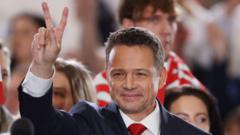In a closely contested election, Rafal Trzaskowski, the liberal mayor of Warsaw and candidate from the centrist Civic Platform party, has garnered 31.3% of the votes, placing him slightly ahead of conservative historian Karol Nawrocki, who received 29.5% of the votes, according to initial polling results. Since no candidate achieved the required majority, a run-off election will be held on June 1. The turnout for this election surpassed 67%, indicating notable public engagement.
Warsaw's Liberal Mayor Trzaskowski Secures Narrow Lead as Presidential Race Heats Up

Warsaw's Liberal Mayor Trzaskowski Secures Narrow Lead as Presidential Race Heats Up
Warsaw's mayor Rafal Trzaskowski leads the Polish presidential election but faces a crucial second round against his rival.
During a rally in Sandomierz, Trzaskowski expressed his confidence in winning but acknowledged the effort and determination needed from his campaign. He also pledged to collaborate with Prime Minister Donald Tusk's coalition to push liberal policies, particularly regarding the strict abortion laws and the reform of a judiciary often viewed as being influenced by the previous government led by the right-wing Law and Justice (PiS) party.
Despite his focus on liberal reforms, Trzaskowski's current standing fell short of pre-election polls that had predicted a margin of 4-6% in his favor over Nawrocki. The president of Poland holds mainly ceremonial duties but has the power to veto legislation passed by the government. Tusk's coalition lacks the parliamentary authority to override such vetoes, meaning the upcoming presidential election carries considerable weight for future legislative achievements.
Nawrocki, who launched his campaign relatively unknown, aims to galvanize support from voters of lesser-known far-right candidates Slawomir Mentzen and Grzegorz Braun, who collectively attracted a significant portion of the vote. His call to action warns against the excessive power of Tusk and the Civic Platform.
As both candidates prepare for the runoff, the key challenge will be attracting additional support from across the political spectrum, particularly from those who veered away from traditional voting paths. The engagement of younger voters—drawn to the ideals of the far-right but wary of Trzaskowski's liberal stances—could sway the election's result.
The ensuing race is set against a backdrop of rising tensions in Polish politics, with liberal and conservative factions poised to reconfigure the nation's future governance. As both campaigns ramp up, the outcome will greatly influence the simple yet pivotal question: who will lead Poland forward?
Despite his focus on liberal reforms, Trzaskowski's current standing fell short of pre-election polls that had predicted a margin of 4-6% in his favor over Nawrocki. The president of Poland holds mainly ceremonial duties but has the power to veto legislation passed by the government. Tusk's coalition lacks the parliamentary authority to override such vetoes, meaning the upcoming presidential election carries considerable weight for future legislative achievements.
Nawrocki, who launched his campaign relatively unknown, aims to galvanize support from voters of lesser-known far-right candidates Slawomir Mentzen and Grzegorz Braun, who collectively attracted a significant portion of the vote. His call to action warns against the excessive power of Tusk and the Civic Platform.
As both candidates prepare for the runoff, the key challenge will be attracting additional support from across the political spectrum, particularly from those who veered away from traditional voting paths. The engagement of younger voters—drawn to the ideals of the far-right but wary of Trzaskowski's liberal stances—could sway the election's result.
The ensuing race is set against a backdrop of rising tensions in Polish politics, with liberal and conservative factions poised to reconfigure the nation's future governance. As both campaigns ramp up, the outcome will greatly influence the simple yet pivotal question: who will lead Poland forward?



















